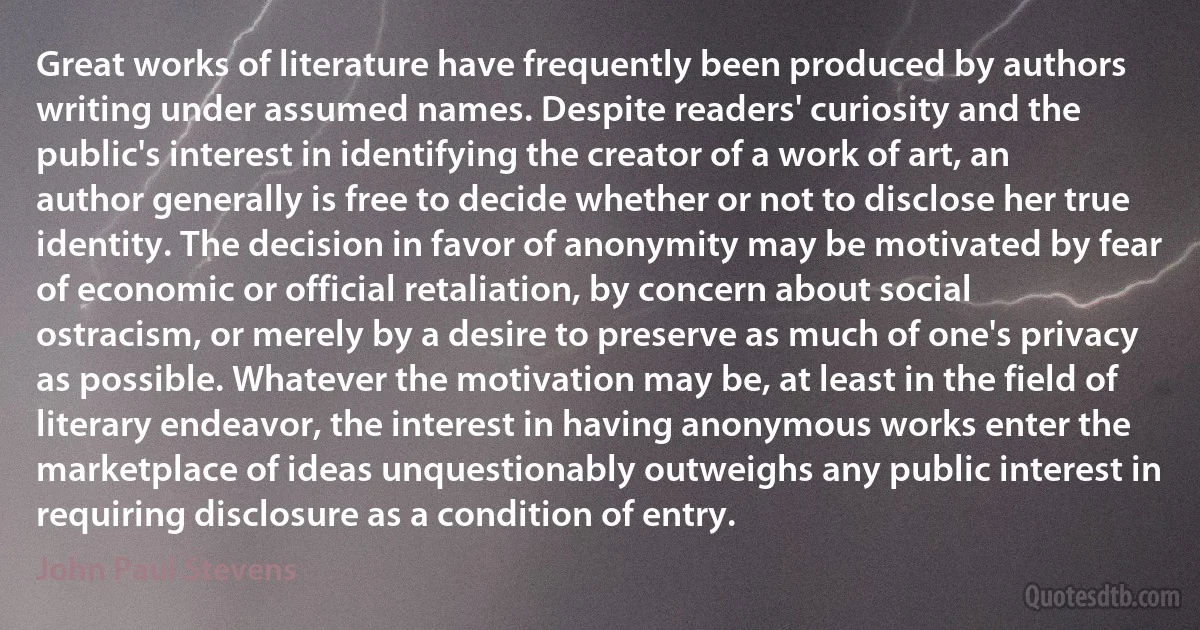
Great works of literature have frequently been produced by authors writing under assumed names. Despite readers' curiosity and the public's interest in identifying the creator of a work of art, an author generally is free to decide whether or not to disclose her true identity. The decision in favor of anonymity may be motivated by fear of economic or official retaliation, by concern about social ostracism, or merely by a desire to preserve as much of one's privacy as possible. Whatever the motivation may be, at least in the field of literary endeavor, the interest in having anonymous works enter the marketplace of ideas unquestionably outweighs any public interest in requiring disclosure as a condition of entry.
John Paul StevensRelated topics
anonymity art condition desire disclose disclosure enter favor fear field free great having identifying interest least ostracism possible preserve public requiring under whatever work works namesRelated quotes
We do not, of course, write literary criticism at all now. Academe has won the battle in which Wilson fought so fiercely on the other side. Ambitious English teachers now invent systems that have nothing to do with literature or life but everything to do with those games that must be played in order for them to rise in the academic bureaucracy. Their works are empty indeed. But then, their works are not meant to be full. They are to be taught, not read. The long dialogue has broken down. Fortunately, as Flaubert pointed out, the worst thing about the present is the future. One day there will be no... But I have been asked not to give the game away. Meanwhile, I shall drop a single hint: Only construct!

Gore Vidal
In the course of my inquiries, I met with the work upon the Trinity, by Dr. Samuel Clarke. This I carefully examined, and although very far from being satisfied, I ceased from further inquiry. This change arose probably from my having acquired the much more valuable work of the same author, on the Being and Attributes of God. This I studied, and felt that its doctrine was much more intelligible and satisfactory than that of the former work. I may now state, as the result of a long life spent in studying the works of the Creator, that I am satisfied they afford far more satisfactory and more convincing proofs of the existence of a supreme Being than any evidence transmitted through human testimony can possibly supply.

Charles Babbage
True, he had been living a lively interior life today: he had dreamed something, he had awoken with an erection, and while shaving he had been dogged by a feeling that today he needed to decide, though he could not see clearly what it was he needed to decide, besides which he was all too aware of his own inability to make any decisions.
Despite that, the thought did cross Kingbitter's mind that he ought to do something about finding a theater to do the play, the comedy (or tragedy?) "Liquidation."
He was now in the ninth year of considering that.
Indeed, Kingbitter was now in the ninth year of considering whether he was handling the literary estate with due diligence.

Imre Kertész
The very name of my subject, economics, suggests economizing or maximizing. But Political Economy has gone a long way beyond home economics. Indeed, it is only in the last third of the century, within my own lifetime as a scholar, that economic theory has had many pretensions to being itself useful to the practical businessman or bureaucrat. I seem to recall that a great economist of the last generation, A. C. Pigou of Cambridge University, once asked the rhetorical question, "Who would ever think of employing an economist to run a brewery?” Well, today, under the guise of operational research and managerial economics, the fanciest of our economic tools are being utilized in enterprises both public and private.

Paul Samuelson
As Adam Smith once said, "There is much ruin in a nation". Our basic structure of values and the interwoven network of free institutions will withstand much. I believe that we shall be able to preserve and extend freedom despite the size of the military programs and despite the economic powers already concentrated in Washington. But we shall be able to do so only if we awake to the threat that we face, only if we persuade our fellowmen that free institutions offer a surer, if perhaps at times a slower, route to the ends they seek than the coercive power of the state. The glimmerings of change that are already apparent in the intellectual climate are a hopeful augury.

Milton Friedman
